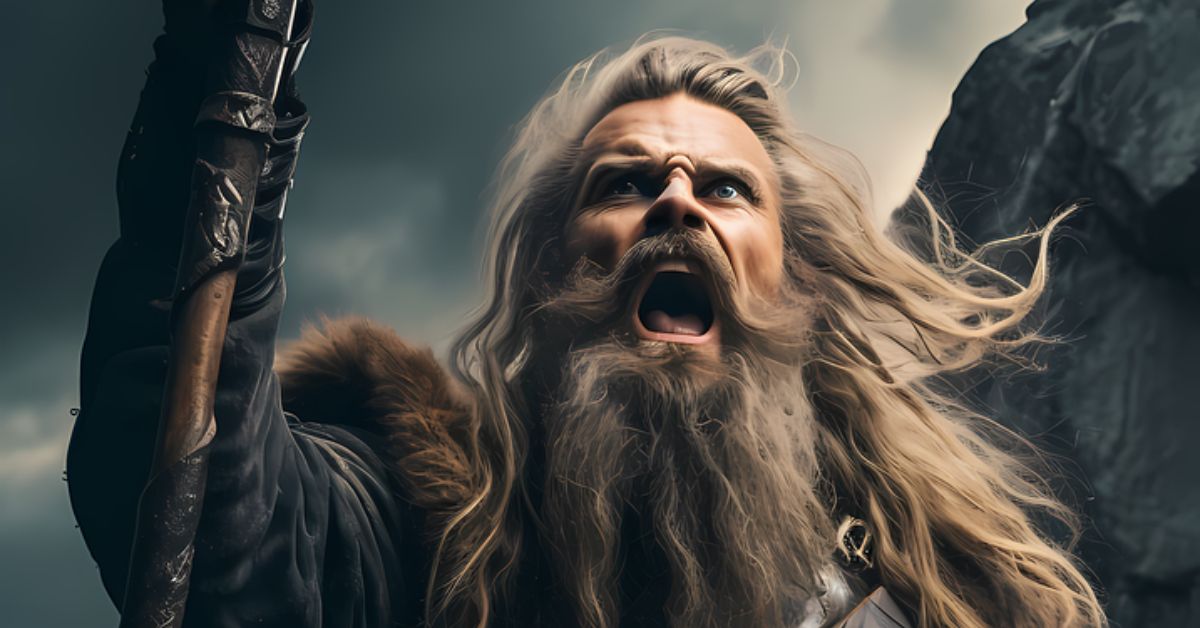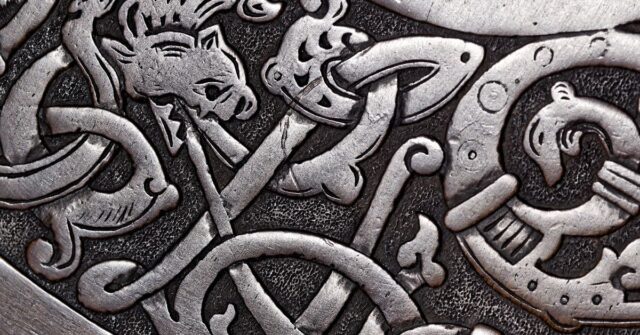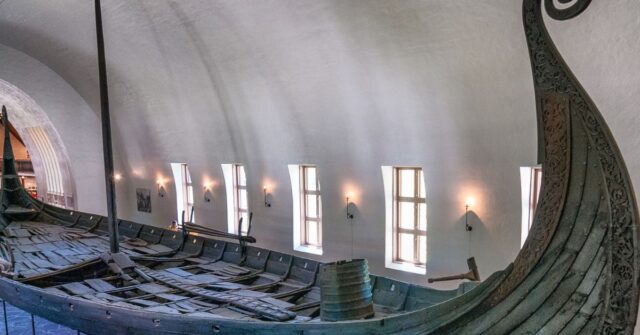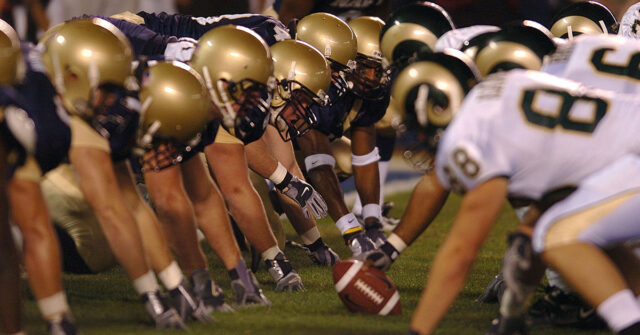Norse mythology has long captivated the imagination with its rich tapestry of gods, heroes, and fantastical creatures.
Its influence extends beyond historical texts, finding a significant place in modern fantasy literature.
This blog post explores the enduring legacy of Norse mythology, its impact on contemporary storytelling, and highlights notable works inspired by these ancient tales.
Introduction
The myths and legends of the Norse people, featuring deities like Odin, Thor, and Loki, continue to fascinate readers and writers alike.
Modern fantasy literature often draws from these ancient stories, weaving them into new narratives that resonate with today’s audiences.
This exploration delves into how Norse mythology has shaped contemporary fantasy literature and provides a comprehensive guide to its most prominent elements and influences.
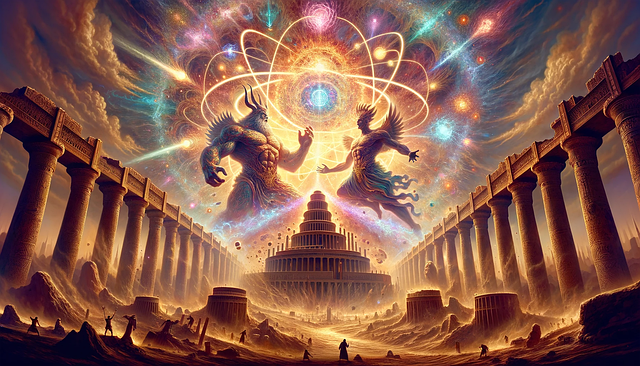
The Enduring Legacy of Norse Mythology
Norse mythology’s legacy is profound, influencing not only literature but also art, film, and popular culture.
The gods and heroes of these myths represent timeless themes such as bravery, betrayal, and the struggle against fate, making them perennially relevant.
Modern Fantasy Literature: A Brief Overview
Modern fantasy literature has roots in ancient mythologies, including Norse mythology.
Authors like J.R.R. Tolkien and Neil Gaiman have brought these ancient stories into contemporary settings, creating rich, immersive worlds that captivate readers and honor the legacy of these timeless tales.
Historical Background of Norse Mythology
Understanding Norse mythology requires delving into the ancient texts and oral traditions that preserved these stories.
The Eddas and sagas, written in Old Norse, are primary sources that offer insights into the beliefs and values of the Norse people.
Major Gods and Goddesses
Norse mythology features a pantheon of gods and goddesses, each with distinct attributes and stories.
These deities play crucial roles in the myths, often embodying various aspects of nature and human experience.
Odin: The Allfather
Odin, the chief of the gods, is associated with wisdom, war, and death. He sacrificed his eye for knowledge and hung himself on Yggdrasil, the World Tree, to gain the secrets of the runes.
Odin’s complex character makes him a fascinating figure in both ancient and modern narratives.
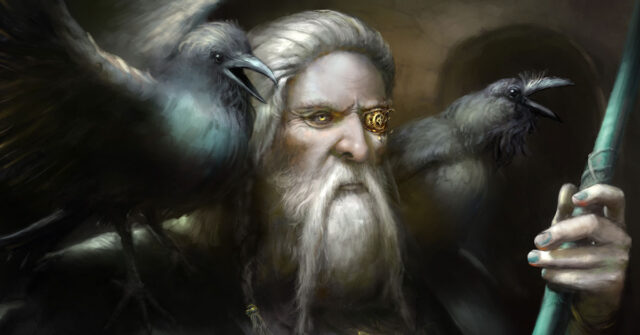
Thor: The Thunderer
Thor, the god of thunder, is known for his immense strength and his hammer, Mjolnir, which he uses to protect Asgard and Midgard from giants and other threats.
His adventures are among the most popular in Norse mythology, showcasing themes of bravery and heroism.
Loki: The Trickster
Loki, the trickster god, is a master of mischief and deceit. His actions often cause trouble for the gods, but he also helps them in critical moments.
Loki’s dual nature and unpredictable behavior make him a compelling character in myth and modern adaptations.
Key Mythological Creatures
Norse mythology is populated with a variety of fantastical creatures, each adding depth and intrigue to the stories.
These beings often play significant roles in the myths, interacting with the gods and heroes in complex ways.
Dragons and Serpents
Dragons and serpents, like the Midgard Serpent, Jormungandr, are powerful and fearsome creatures in Norse mythology.
These beings symbolize chaos and destruction, often serving as formidable foes for the gods and heroes.
Giants and Dwarves
Giants, or Jotnar, are both enemies and ancestors of the gods, representing the untamed forces of nature.
Dwarves, on the other hand, are skilled craftsmen, creating magical items like Thor’s hammer and Odin’s spear. These contrasting roles highlight the diversity of characters in Norse myths.
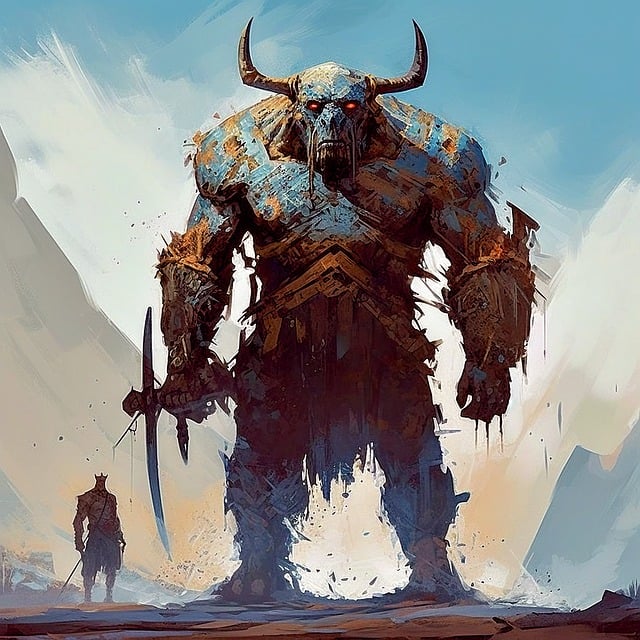
Valkyries and Other Supernatural Beings
Valkyries are warrior maidens who serve Odin by selecting those who will die in battle and bringing them to Valhalla.
Other supernatural beings, like elves and spirits, also feature prominently in the myths, each contributing to the rich tapestry of Norse storytelling.
Norse Myths and Medieval Sagas
The sagas, written during the medieval period, are a treasure trove of Norse myths and legends. These stories provide detailed accounts of the gods’ adventures and the heroic deeds of legendary figures.
The Saga of the Volsungs
The Saga of the Volsungs is one of the most famous medieval sagas, chronicling the adventures of the hero Sigurd and his quest to slay the dragon Fafnir.
This saga incorporates numerous elements of Norse mythology, including the gods Odin and Loki, and explores themes of heroism, fate, and betrayal.
Other Influential Sagas
Other notable sagas include the Prose Edda and the Poetic Edda, which contain a wealth of mythological stories.
These texts have been invaluable in preserving the myths and providing inspiration for modern adaptations.
Influence of Norse Mythology on Modern Fantasy Literature
Modern fantasy literature owes a significant debt to Norse mythology.
The themes, characters, and settings of these ancient stories have inspired countless authors and shaped the genre in profound ways.
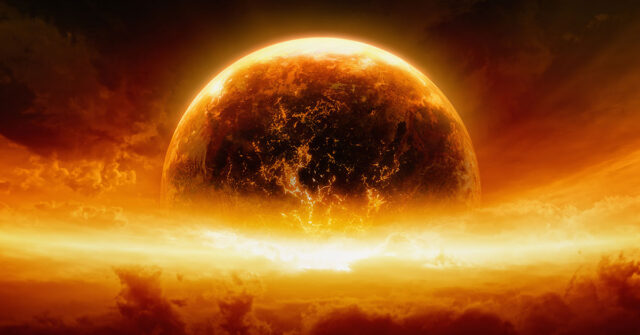
Norse Elements in Contemporary Stories
Elements of Norse mythology appear in many modern fantasy stories, from the structure of the hero’s journey to the portrayal of cosmic battles between good and evil.
These influences help create rich, immersive worlds that captivate readers.
The Hero’s Journey
The concept of the hero’s journey, central to many Norse myths, remains a staple of modern fantasy literature. Heroes like Sigurd and Thor undergo epic quests, facing trials and adversaries that test their strength and resolve. This narrative structure is mirrored in contemporary works, providing a timeless framework for storytelling.
The Concept of Fate and Destiny
Fate, known as ‘wyrd’ in Norse mythology, is an inescapable force that shapes the lives of gods and mortals alike.
This theme is prevalent in modern fantasy, where characters often struggle against or embrace their destinies, adding depth and complexity to the narratives.
The Struggle Between Good and Evil
The eternal battle between good and evil is a central theme in Norse mythology, reflected in the conflicts between gods and giants, order and chaos.
Modern fantasy literature frequently explores this dichotomy, creating stories that resonate with readers through their moral and philosophical implications.
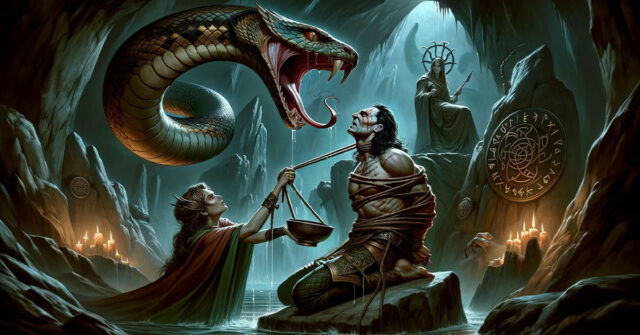
Notable Authors and Works
Many contemporary authors have drawn inspiration from Norse mythology, crafting stories that bring these ancient tales to new audiences.
Their works highlight the enduring appeal of these myths and their relevance to modern readers.
Neil Gaiman’s American Gods
Neil Gaiman’s “American Gods” is a masterful blend of mythology and modern storytelling.
The novel features Norse gods like Odin and Loki, who navigate a contemporary American landscape while struggling to maintain their relevance in a world that has forgotten them.
Gaiman’s work demonstrates the versatility of Norse mythology in exploring themes of identity, belief, and change.
Rick Riordan’s Magnus Chase Series
Rick Riordan’s “Magnus Chase and the Gods of Asgard” series introduces young readers to Norse mythology through the adventures of Magnus Chase, a modern-day demigod. Riordan skillfully incorporates Norse myths into his narrative, making them accessible and engaging for a new generation.
Other Influential Works
Other notable works inspired by Norse mythology include Joanne Harris’s “Runemarks,” J.R.R. Tolkien’s “The Lord of the Rings,” and Poul Anderson’s “The Broken Sword.”
These books showcase the diverse ways in which Norse mythology can be integrated into fantasy literature, enriching the genre with its timeless themes and characters.
Character Archetypes Derived from Norse Mythology
Character archetypes from Norse mythology continue to influence modern fantasy literature, providing writers with a rich source of inspiration for creating memorable and dynamic characters.
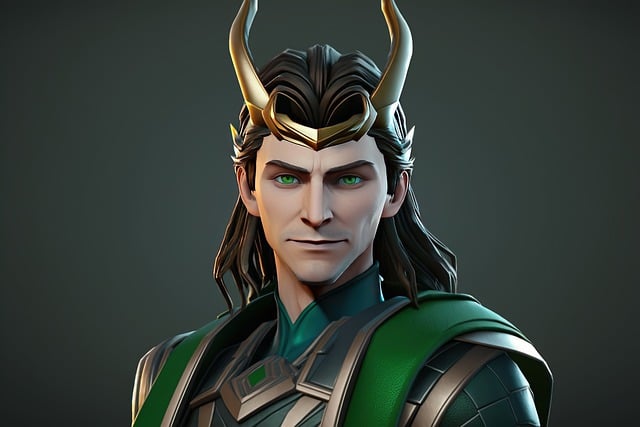
The Trickster
Loki, the quintessential trickster, embodies cunning and chaos. His unpredictable nature and ability to shape-shift make him a compelling figure in both ancient myths and modern stories.
Trickster characters add an element of unpredictability and complexity to the narrative, challenging heroes and gods alike.
The Seer
Odin’s quest for wisdom and his role as a seer who can foresee the future is a powerful motif in Norse mythology.
Seer characters in modern fantasy often possess similar traits, using their knowledge to guide or manipulate the course of events, adding layers of intrigue and foresight to the story.
The Berserker
Berserkers, fierce warriors who fought with uncontrollable rage, are another archetype derived from Norse mythology.
These characters, driven by an almost supernatural fury, often serve as formidable allies or terrifying adversaries in modern fantasy tales.
World-Building Inspired by Norse Mythology
World-building is a crucial aspect of modern fantasy literature, and many authors draw heavily from Norse mythology to create immersive and believable settings.
The rich cosmology, diverse creatures, and intricate lore of Norse myths provide a fertile ground for developing complex and engaging worlds.

Cosmology and Realms
Norse mythology features a complex cosmology with nine realms interconnected by Yggdrasil, the World Tree.
This structure inspires many fantasy worlds, where different realms or dimensions play significant roles in the narrative.
Authors often use similar concepts to add depth and breadth to their stories, allowing for a variety of settings and adventures.
Magical Artifacts and Symbols
Magical artifacts in Norse mythology, such as Thor’s hammer Mjolnir and Odin’s spear Gungnir, are imbued with powerful enchantments and significant cultural meaning.
Modern fantasy literature frequently incorporates similar artifacts, which often become central to the plot.
These items symbolize power, heritage, and destiny, enriching the narrative and providing characters with unique challenges and advantages.
Integration of Norse Myths into Fantasy Settings
Integrating Norse myths into fantasy settings involves blending ancient stories with new elements to create a seamless and engaging world.
Authors like J.R.R. Tolkien and Neil Gaiman have mastered this, using Norse mythology as a foundation upon which to build their unique worlds.
This approach allows readers to connect with the familiar while exploring new and imaginative landscapes.
Book Recommendations
For readers interested in exploring the intersection of Norse mythology and modern fantasy literature, several books stand out for their creative use of mythological elements and compelling storytelling.
These works not only entertain but also deepen the reader’s appreciation of Norse myths.
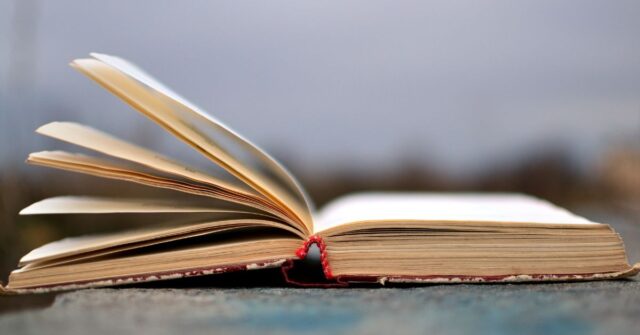
Essential Reads for Norse Mythology Enthusiasts
Here are some highly recommended books that weave Norse mythology into their narratives, offering thrilling adventures and profound insights.
The Sword of Summer by Rick Riordan
“The Sword of Summer” is the first book in the “Magnus Chase and the Gods of Asgard” series by Rick Riordan.
It follows the story of Magnus Chase, a homeless teenager who discovers his Norse heritage and embarks on a quest involving gods, giants, and mythical creatures.
Riordan’s engaging writing style and modern twist on ancient myths make this book a must-read.
The Wolf in the Whale by Jordanna Max Brodsky
“The Wolf in the Whale” combines Norse and Inuit mythologies in a captivating narrative.
The protagonist, Omat, is an Inuit shaman who encounters Viking explorers, leading to a clash of cultures and deities.
This novel explores themes of survival, identity, and the power of belief, making it a unique addition to the genre.
Norse Mythology by Neil Gaiman
In “Norse Mythology,” Neil Gaiman retells the classic myths with his distinctive voice and storytelling flair.
This collection covers the major tales from the creation of the world to Ragnarok, providing readers with an accessible and enjoyable introduction to Norse mythology.
Gaiman’s love for the subject shines through, making this book both informative and entertaining.
Other Noteworthy Titles
Additional books worth exploring include “Runemarks” by Joanne Harris, “The Broken Sword” by Poul Anderson, and “American Gods” by Neil Gaiman.
Each of these works incorporates Norse mythology in innovative ways, offering readers a rich tapestry of stories that blend ancient lore with modern themes.
Conclusion
Norse mythology continues to captivate readers and writers, providing a rich source of inspiration for modern fantasy literature.
The themes, characters, and settings of these ancient myths resonate with contemporary audiences, ensuring their enduring relevance.
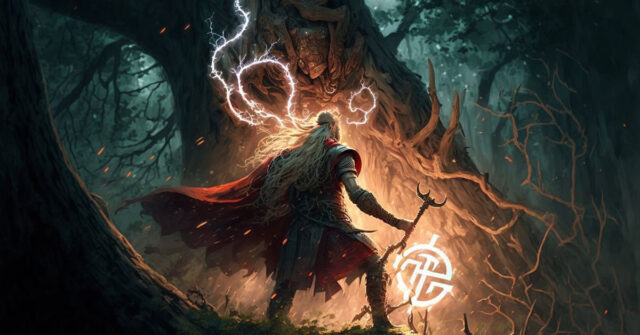
The Continuing Relevance of Norse Mythology
The timeless appeal of Norse mythology lies in its exploration of universal themes such as heroism, fate, and the struggle between order and chaos.
These stories offer insights into the human condition, making them perpetually relevant and engaging for modern readers.
Encouraging Further Exploration
For those intrigued by the intersection of Norse mythology and modern fantasy literature, there is a wealth of material to explore.
From classic retellings to innovative new works, these stories invite readers to delve deeper into the myths and discover the enduring magic of the Norse sagas.

